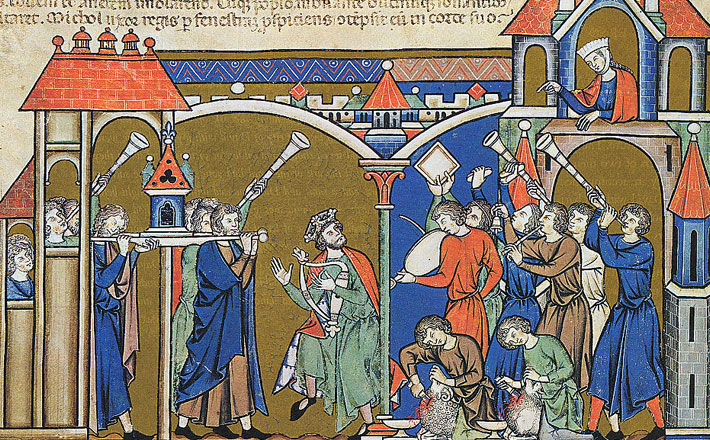Commentary on Numbers 21:4-9
Nearly everything about this text feels far removed from 21st-century life.
It chafes against both our theological sensibilities and our scientific good sense. Surely God does not send poisonous snakes to punish human beings for their missteps? Certainly just looking at a bronze snake does not assuage a medical ailment like snakebite. Where is the anti-venom? Where is the splint? And where is the God with whom we feel safe and comfortable?
The Hebrews who wandered through the wilderness did not experience God as a safe and comfortable companion. In the great showdown with Pharaoh in Exodus 1-14, God sends ten vicious plagues to show the superiority of the God of Israel over Egypt’s gods, including Pharaoh, who made his own claims to divinity. On the way out of Egypt, God appears as a pillar of cloud by day and a pillar of cloud by night, a sight that incites panic in the Egyptians (Exodus 13:21, 14:24). At Sinai, God thunders on the mountain in fire and smoke, terrifying the Israelites (Exodus 19:18, 20:18-1). These are not the images of God that call us to snuggle up in God’s everlasting arms, “safe and secure from all alarms,” as the old hymn goes.
Despite these great displays of God’s power, the Israelites do not have much confidence that God will, in fact, deliver them into the Promised Land. It only takes three verses to move from their songs of triumph (Exodus 15:1-21) to their first grumbling (Exodus 15:24). In this week’s text from Numbers, the peoples’ complaint sounds like something that could be attributed to Yogi Berra: “Why have you brought us up out of Egypt to die in the wilderness? For there is no food (lechem) and no water, and we detest this miserable food (lechem)” (v. 5). In other words, we don’t have any food, and it tastes terrible, too! (The wording of the complaint is also vaguely reminiscent of the wonderful line from Mark Twain’s The Adventures of Huckleberry Finn, when Huck tries to speak well of a farmer-preacher by proclaiming that he “never charged nothing for his preaching, and it was worth it, too.”)
In the text of Numbers 21, the utterance of the complaint is immediately followed by the statement, “Then the LORD sent poisonous serpents among the people, and they bit the people, so that many Israelites died” (v. 6). Neither the narrator nor God ever explicitly says that God sent the snakes because the people complained. That causality does seem to be implied, especially because the people themselves name their “speaking against” God and Moses as the ultimate source of their suffering (v. 7). The narrative specifies that God sends the snakes, but never does either God or the narrator call the snakes a punishment; the people themselves draw that conclusion.
I wonder if the Israelites might have fallen into the old post hoc ergo propter hoc fallacy: “after this, therefore because of this.” Maybe God did not send the snakes because of their quarreling after all. Crying out to God in complaint is not usually condemned in Scripture; there is a whole genre of psalms that centers on complaint or lament! Of course, there are times in Scripture when “speaking against” God or God’s messenger does bring catastrophe. When Miriam and Aaron “speak against” Moses’ Cushite wife, Miriam is stricken with a skin disease (Numbers 12:1-16), and God’s anger is clearly described as the cause. Even so, in this week’s reading, we, like the Israelites themselves, are left to draw our own conclusions. Is God punishing the people with the snakes? If God sent the snakes, then surely the people deserved it?! Otherwise there was no discernible reason, and now this God is much less predictable, much less safe, than we ever could have imagined.
The people name their sin and then ask Moses to pray for them. This role as intermediary is what Moses does best: facilitating communication between God and God’s people. In this story, God does not give the people what they ask for. They want Moses to get God to “take away the serpents from us” (Numbers 21:7). But the serpents do not go away, nor do they stop biting. Instead, God instructs Moses on how to heal the people who are bitten; they are still bitten, but they live. Deliverance does not come in the way that they expect.
As 21st-century Christians it may take us out of our comfort zones to imagine God as a dangerous, unpredictable presence in our lives. Yet, if we claim that we’ve got God all figured out, then we have ignored the mystery and divine freedom with which God is characterized throughout much of Scripture. A domesticated, unmoving God does not pull a people out of slavery, through the wilderness, and into the Promised Land; no, we need a God who is, in those oft-repeated words of Don Juel, “on the loose!”
Moses’ serpent-on-a-pole shows up again in the Old Testament, at 2 Kings 18:4: “[Hezekiah] removed the high places, broke down the pillars, and cut down the sacred pole. He broke in pieces the bronze serpent that Moses had made, for until those days the people of Israel had made offerings to it; it was called Nehushtan.” The Israelites had forgotten the living, free, dangerous God who commanded the construction of the serpent of the wilderness, and they focused instead on a bronzed, domesticated, manufactured idol that they could see and understand. Perhaps it is the task of preaching to break up our bronzed serpents and to turn our attention instead to the God of the wilderness: dangerous, maybe, and unpredictable for sure, but always present, always faithful.


March 15, 2015